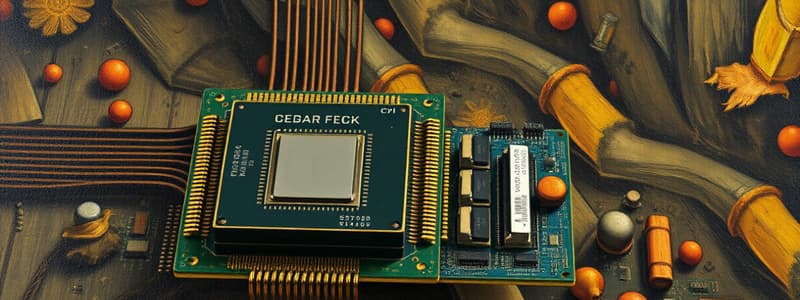Podcast
Questions and Answers
What is the primary role of the Central Processing Unit (CPU)?
What is the primary role of the Central Processing Unit (CPU)?
- Executing instructions (correct)
- Connecting system components via the bus
- Managing I/O devices
- Storing data in RAM
How does sufficient RAM contribute to the performance of a multiprocessor system?
How does sufficient RAM contribute to the performance of a multiprocessor system?
- It powers the CPU cores directly.
- It reduces the load on the cache memory.
- It stores instructions for peripheral devices.
- It allows fast access to data needed by multiple processors. (correct)
What is the benefit of cache memory in relation to CPU processing?
What is the benefit of cache memory in relation to CPU processing?
- It increases the main memory size.
- It stores frequently accessed data for faster retrieval. (correct)
- It allows for easier handling of I/O tasks.
- It directly manages communication between devices.
Which components are managed by the operating system?
Which components are managed by the operating system?
What role does the bus system play in a computer system?
What role does the bus system play in a computer system?
In a multiprocessor system, how do I/O devices contribute to overall performance?
In a multiprocessor system, how do I/O devices contribute to overall performance?
Which statement best describes the function of a multiprocessor system?
Which statement best describes the function of a multiprocessor system?
Why is it important for the bus system to be fast and efficient in a multiprocessor setup?
Why is it important for the bus system to be fast and efficient in a multiprocessor setup?
Flashcards are hidden until you start studying
Study Notes
Central Processing Unit (CPU)
- CPU is the primary component responsible for executing instructions, often referred to as the computer's "brain."
- In multiprocessor systems, multiple CPUs or cores collaborate to enhance performance and efficiently execute tasks.
- Distributing tasks among CPU cores enhances gaming experiences by ensuring smooth and seamless operation.
Memory (RAM)
- RAM (Random Access Memory) is used for temporarily storing data that is actively being processed by the computer.
- Adequate RAM is essential in multiprocessor systems, allowing all processors quick access to necessary data.
- Sufficient RAM enables users to switch between tasks fluidly, minimizing lag and maintaining productivity.
Cache Memory
- Cache memory is a smaller, faster memory type located closer to CPU cores, designed to expedite data access.
- It stores frequently accessed data, reducing the need for the CPU to retrieve it from the slower main memory.
- Utilizing cache memory enhances overall processing speed and makes user interactions quicker and more efficient.
Input/Output (I/O) Devices
- I/O devices facilitate interaction between the computer and external elements such as keyboards, mice, displays, and storage systems.
- Multiprocessor systems efficiently manage I/O devices to ensure uninterrupted data flow during simultaneous tasks.
- The system can concurrently process multiple I/O tasks, allowing activities like movie playback and file transfers without disruption.
Bus System
- The bus system acts as the communication network among all components within a computer, enabling data exchange.
- A fast and efficient bus system is crucial in multiprocessor setups to accommodate higher data traffic.
- Similar to how a network router manages data for seamless streaming, the bus system ensures efficient data flow between processors, memory, and I/O devices.
Operating System
- The operating system (OS) governs the computer’s hardware and software resources.
- In multiprocessor systems, the OS plays a critical role in distributing tasks efficiently across all available processors.
- The OS functions like a project manager, optimizing task allocations to enhance overall system effectiveness and efficiency.
Studying That Suits You
Use AI to generate personalized quizzes and flashcards to suit your learning preferences.




